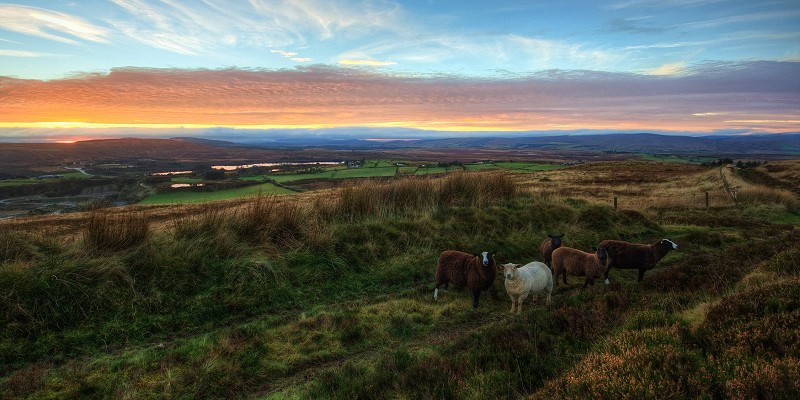An Interview with Dr Jane McCullough, Manager of Climate Northern Ireland.

Jane sat down with us to answer questions about her role at Climate Northern Ireland. Highlighting the activities Climate NI are involved in, Jane discusses the organisation's success stories and how they are encouraging the people of Northern Ireland to take climate change seriously.
Q1) Can you tell us a little about your background and current role at Climate NI?
I studied Architecture at Queen’s University Belfast (QUB) where I began to recognise the importance of sustainability and climate change policy. After my post-graduate degree I worked as a research assistant at QUB and then competed my PhD which explored the ‘energy performance gap’ which causes new homes to consume considerably more energy than predicted. My research explored the influence of different design strategies on how occupants understand and use energy in their homes. During this time, I worked on projects with the Northern Ireland Housing Executive and Housing Associations.
My position at Climate NI provides a great opportunity to continue working on climate change policy, and to widen my focus from buildings to a broader remit at a more strategic level. Currently, I am the manager of Climate Northern Ireland, which is funded by the Department of Agriculture, Environment and Rural Affairs (DAERA). We deliver on several areas of work. Our main focus is on engaging businesses, academics, community organisations and local councils in planning for the impacts of climate change. We also raise awareness and support sharing of good practice across various sectors. This work is guided and supported by a cross-sectoral steering group which involves a broad range of organisations and individuals and works to encourage interdisciplinary solutions to climate hazards such as flooding, overheating and storms.
Q2) An aim of Climate NI is to raise awareness on the impacts of climate change within organisations and with the general public. How do you encourage them to take climate change more seriously?
In the UK we are fortunate to have a climate change risk assessment published by the Committee on Climate Change (CCC) every five years. It takes the best science available and provides a detailed assessment of the climate change risks that face Northern Ireland. When working with councils, organisations or businesses, we help them to use this assessment to understand the climate hazards they are facing. We discuss how organisations have been affected by recent weather events like flooding, or gradual changes such as an increased requirement for grass cutting due to a longer growing season. We also consider how this might differ as our climate changes. This information can be used to identify where an organisation or community is vulnerable and to develop an action plan to address these vulnerabilities. The work of Climate NI aims to illustrate that if we do not prepare, climate change will create disruption across society.
Q3) Is there anything you would like to see people and businesses in NI doing more of to mitigate against the effects on climate change?
Climate NI undertook a piece of research in 2016 in partnership with QUB which highlighted that the majority of businesses in Northern Ireland did not have a business continuity plan. Climate NI is keen to encourage uptake of business resilience and climate hazard planning. For example, Climate NI has been working with Lakeland Dairies on the development of a business continuity tool which supports dairy farmers to plan for climate change. The tool will be made publically available later this year. Other useful business climate change planning tools are available, as listed our website.
Q4) Focusing on your organisation's recent project, the 'Collaborative Learning Initiative Managing and Adapting to the Environment (C.L.I.M.A.T.E), what has been the most rewarding aspect of this collaboration?
This is an important time for local councils in Northern Ireland, as our region takes crucial steps to prepare for the impacts of climate change. This project will provide the foundations on which to build a climate resilient local government sector. The C.L.I.M.A.T.E project is funded by NPA Interreg VB, led by Derry City and Strabane District Council and delivered in partnership with Climate NI (facilitated by Northern Ireland Environment Link), with partners across Ireland, the Faroe Islands, Sweden, Finland and Iceland. The project has two aims; the first, to develop a tool that local councils can use to formulate a climate change adapation plan. The tool will guide councils through an adaption planning process, where they gain understanding of how they are vulnerable to climate change, determine actions to improve their resilience, implement actions and monitor progress. The second aim is to deliver the first climate change adaptation plan for a council in Northern Ireland. This project will make a considerable contribution to future resilience in this sector. In particular, experience from other regions will ensure the local government adaptation planning tool will benefit from the best methods and science available. Based on this work, Climate NI will make a Northern Ireland adaptation planning tool available to all NI's local councils in 2020.
Q5) Are there any success stories from your time working in Climate NI that stand out to you?
Climate NI have recently drafted a chapter for the Northern Ireland Climate Change Adaptation Programme (published by government every five years), which outlines actions which civil society and local government will take over the next five years to enable our region to become more resilient to the impacts of climate change. This is the first time this programme has included actions outside central government, and provides a vital opportunity for all sectors in Northern Ireland to work together to tackle this important issue. This programme is due to be published in Spring 2019.



